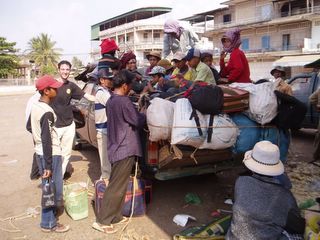On Top of Things
Four weeks ago I told EWB’s Director of Overseas Projects, Russ, that I was planning on crossing the border into Vietnam to change my visa status in Cambodia. “No problem,” wrote Russ, “I just need to know the dates you’ll be away so I can adjust your insurance.” I had no idea that crossing international boundaries would affect my insurance. Engineers Without Borders eh? How ironic.
“Anything else that I should know about that will affect the insurance?” I asked, “Motorcycles with too many passengers? Travelling in the back of pickups?” “Motorbikes are fine,” responded Russ, “Just don’t do anything too stupid like travel on the roof of a bus.”
In retrospect, I wonder how he knew…
It started innocently enough. I was in the province of Kratie, working my way towards Ratanakiri near the Laotian and Vietnamese borders. Share taxi service was infrequent, pickup trucks apparently more so. Buses were non-existent. I was doing some quick shopping in the market while I waited for my share taxi to fill so that we could depart. Lounging nearby at the guesthouse where I had been staying were two Poles, waiting for a pickup to depart. We chatted a bit while they convinced me that their pickup would be the cheaper, quicker, and more culturally authentic means of transport to Ratanakiri. Together we went to the taxi park to alter my travel plans.
After about two hours of waiting, the pickup began to fill. “We should probably go reserve ourselves some seats,” I said. “Don’t worry about it,” my new friends responded, “We are barang (foreigners). They’ll tell us when we should board.” An hour later, twenty-six people, their luggage and even some furniture were crammed onto the back of the pickup. “Maybe we should board,” I said again. “You’re probably right,” they responded, “You’re the engineer. Where will we fit?” Already dreading the answer, I examined the situation. “Nowhere left but the roof,” I told them.
We climbed onto the roof. It was already somewhat occupied. The only seats left were on a hard metal grill covered by a tarp, facing nothing but the hood and the empty air above it. Ninety minutes of forty plus degree direct sun later, we began to move. I felt like a fool for being on the roof. Still, this was an adventure and I was excited!
Soon, the dust started. In front of us, sitting calmly on the hood like a Buddha with sunglasses, legs crossed, one hand on a windshield wiper, was an employee of the truck company. At sixty kph, the only way to breath while surrounded by Cambodian dust is with a mask. I had two. I offered him one and took the other for myself. Both immediately broke. I tried to hold mine on with one hand while hanging on for dear life with the other. Unable to see through the flying dirt, I put on my sunglasses. I reviewed the road as it passed underneath us. The sunglasses fell off. “Easy come easy go,” I thought. I was about to spend the next eight hours with my hand over my mouth and my eyes tightly shut.
Only it was going to be closer to fifteen hours.
Next, the rain started. The pickup stopped. The tarp that had been our cushion came out and became our shelter. I was now wet, holding a tarp against the sixty kph headwind, with my butt resting on a hard metal grille. Going over Cambodian roads, the worst ones in Asia, the potholes resembled bomb craters. Given the history of civil war in this country, some of them may have been. To avoid these, our pickup swerved constantly from one end of the road to the other. When our driver made a mistake, the pickup would crash into a pothole, jarring my behind, and causing the whole truck to tilt as much as thirty degrees to the side. My underside took a beating. I hung on for dear life. The man behind me sat with one leg to the back of the pickup and one over the side. His daughter sat on his lap, dangling precariously over the edge. No one seemed very surprised by this.
Eventually the rain stopped. The tarp was refolded so that it no longer covered my seat. I repaired my dust mask. I cushioned my underside with several cotton sarongs and a copy of Lonely Planet Cambodia. The ride continued. After an hour, the sarongs and the Lonely Planet were no longer much help. “Are you regretting not taking the share taxi?” the Poles asked me with some concern.
The ride continued. Every forty minutes we stopped so that the driver could pour water on the overheating engine. My butt hurt. Night fell. I wanted to sleep. This was not a good idea. The roads were getting worse. We stopped twice for about an hour to doze and let the engine cool. I lay down in the dirt on the side of the road, stared at the stars, and wondered when the journey would end. We arrived in Ratanakiri at 7am the next morning, fifteen hours after our departure.
As an aside, four days later, on the return journey, I took the share-taxi to Kratie and a nice air-con bus to Phnom Penh. This time, all I had to contend with was a woman, seated underneath the driver, who seemed to be involved in a domestic dispute. She would alternately yell at a nearby motorcycle carrying a man and boy, or throw up out the driver’s side window.



0 Comments:
Post a Comment
<< Home